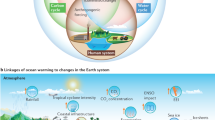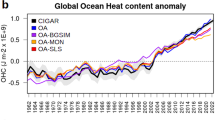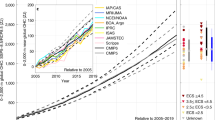Abstract
As the dominant reservoir of heat uptake in the climate system, the world’s oceans provide a critical measure of global climate change. Here, we infer deep-ocean warming in the context of global sea-level rise and Earth’s energy budget between January 2005 and December 2013. Direct measurements of ocean warming above 2,000 m depth explain about 32% of the observed annual rate of global mean sea-level rise. Over the entire water column, independent estimates of ocean warming yield a contribution of 0.77 ± 0.28 mm yr−1 in sea-level rise and agree with the upper-ocean estimate to within the estimated uncertainties. Accounting for additional possible systematic uncertainties, the deep ocean (below 2,000 m) contributes −0.13 ± 0.72 mm yr−1 to global sea-level rise and −0.08 ± 0.43 W m−2 to Earth’s energy balance. The net warming of the ocean implies an energy imbalance for the Earth of 0.64 ± 0.44 W m−2 from 2005 to 2013.
This is a preview of subscription content, access via your institution
Access options
Subscribe to this journal
Receive 12 print issues and online access
$209.00 per year
only $17.42 per issue
Buy this article
- Purchase on Springer Link
- Instant access to full article PDF
Prices may be subject to local taxes which are calculated during checkout



Similar content being viewed by others
References
IPCC Climate Change 2013: The Physical Science Basis (eds Stocker, T. F. et al.) (Cambridge Univ. Press, 2013).
Church, J. A. & White, N. J. Sea-level rise from the late 19th to the early 21st century. Surv. Geophys. 32, 585–602 (2011).
Cazenave, A. & Llovel, W. Contemporary sea level rise. Annu. Rev. Mar. Sci. 2, 145–173 (2010).
Church, J. A. et al. Revising the Earth’s sea-level and energy budgets from 1961 to 2008. Geophys. Res. Lett. 38, L18601 (2011).
Willis, J. K., Chambers, D. P. & Nerem, R. S. Assessing the globally averaged sea level budget on seasonal to interannual time scales. J. Geophys. Res. 113, C06015 (2008).
Cazenave, A. et al. Sea level budget over 2003–2008: A reevaluation from GRACE space gravimetry, satellite altimetry and Argo. Glob. Planet. Change 65, 83–88 (2009).
Leuliette, E. W. & Miller, L. Closing the sea level rise budget with altimetry, Argo, and GRACE. Geophys. Res. Lett. 36, L04608 (2009).
Llovel, W., Guinehut, S. & Cazenave, A. Regional and interannual variability in sea level over 2002–2009 based on satellite altimetry, Argo float data and GRACE ocean mass. Ocean Dyn. 60, 1193–1204 (2010).
Leuliette, E. W. & Willis, J. K. Balancing the sea level budget. Oceanography 24, 122–129 (2011).
Chen, J. L., Wilson, C. R. & Tapley, B. D. Contribution of ice sheet and mountain glacier melt to recent sea level rise. Nature Geosci. 6, 549–552 (2013).
Llovel, W., Fukumori, I. & Meyssignac, B. Depth-dependent temperature change contributions to global mean thermosteric sea level rise from 1960 to 2010. Glob. Planet. Change 101, 113–118 (2013).
Abraham, J. P. et al. A review of global ocean temperature observations: Implications for ocean heat content estimates and climate change. Rev. Geophys. 51, 450–483 (2013).
Purkey, S. G. & Johnson, G. C. Warming of global abyssal and deep Southern Ocean waters between the 1990s and 2000s: Contributions to global heat and sea level rise budgets. J. Clim. 23, 6336–6351 (2010).
Kouketsu, S. et al. Deep ocean heat content changes estimated from observation and reanalysis product and their influence on sea level change. J. Geophys. Res. 116, C03012 (2011).
Trenberth, K. E. & Fasullo, J. T. Tracking Earth’s energy. Science 328, 316–317 (2010).
Balmaseda, M. A., Trenberth, K. E. & Källén, E. Distinctive climate signals in reanalysis of global ocean heat content. Geophys. Res. Lett. 40, 1754–1759 (2013).
Nerem, R. S., Chambers, D. P., Choe, C. & Mitchum, G. T. Estimating mean sea level change from the TOPEX and Jason Altimeter Missions. Mar. Geodesy 33, 435–446 (2010).
Llovel, W. et al. Terrestrial waters and sea level variations on interannual time scale. Glob. Planet. Change 75, 76–82 (2011).
Boening, C., Willis, J. K., Landerer, F. W., Nerem, R. S. & Fasullo, J. The 2011 La Niña: So strong, the oceans fell. Geophys. Res. Lett. 39, L19602 (2012).
Fasullo, J. T., Boening, C., Landerer, F. W. & Nerem, R. S. Australia’s unique influence on global sea level in 2010–2011. Geophys. Res. Lett. 40, 4368–4373 (2013).
Cazenave, A. et al. The rate of sea-level rise. Nature Clim. Change 4, 358–361 (2014).
Leuliette, E. W. & Scharroo, R. Integrating Jason-2 into a multiple-altimeter climate data record. Mar. Geodesy 33, 504–517 (2010).
Lyman, J. M. & Johnson, G. C. Estimating global ocean heat content changes in the upper 1800 m since 1950 and the influence of climatology choice. J. Clim. 27, 1945–1957 (2014).
Levitus, S. et al. World ocean heat content and thermosteric sea level change (0–2000 m), 1955–2010. Geophys. Res. Lett. 39, L10603 (2012).
Chambers, D. P., Wahr, J., Tamisiea, M. E. & Nerem, R. S. Ocean mass from GRACE and glacial isostatic adjustment. J. Geophys. Res. 115, B11415 (2010).
Altamimi, Z., Collilieux, X. & Métivier, L. ITRF2008: An improved solution of the International Terrestrial Reference Frame. J. Geod. 85, 457–473 (2011).
Von Schuckmann, K. & Le Traon, P-Y. How well can we derive Global Ocean Indicators from Argo data? Ocean Sci. 7, 783–791 (2011).
Loeb, N. et al. Observed changes in top-of-the-atmosphere radiation and upper-ocean heating consistent within uncertainty. Nature Geosci. 5, 110–113 (2012).
Mitchum, G. An improved calibration of satellite altimetric heights using tide gauge sea levels with adjustment for land motion. Mar. Geodesy 23, 145–166 (2000).
Johnson, G. C. & Chambers, D. P. Ocean bottom pressure seasonal cycles and decadal trends from GRACE Release-05: Ocean circulation implications. J. Geophys. Res. 118, 4228–4240 (2013).
Swenson, S., Chambers, D. & Wahr, J. Estimating geocenter variations from a combination of GRACE and ocean model output. J. Geophys. Res. 113, B08410 (2008).
Geruo, A., Wahr, J. & Zhong, S. J. Computations of the viscoelastic response of a 3-D compressible Earth to surface loading: An application to glacial isostatic adjustment in Antarctica and Canada. Geophys. J. Int. 192, 557–572 (2013).
Cheng, M. K., Tapley, B. D. & Ries, J. C. Deceleration in the Earth’s oblateness. J. Geophys. Res. 118, 740–747 (2013).
Roemmich, D. & Gilson, J. The 2004–2008 mean and annual cycle of temperature, salinity and steric height in the global ocean from the Argo program. Prog. Oceanogr. 82, 81–100 (2009).
Hosoda, S. et al. A monthly mean dataset of global oceanic temperature and salinity derived from Argo float observations. JAMSTEC Rep. Res. Dev. 8, 47–59 (2008).
Wong, A. P. S. et al. Argo Quality Control Manual, Version 2.31 Ar-um-04-01 (2008)
Acknowledgements
W.L. was supported by Oak Ridge Associated Universities through the NASA Postdoctoral Program (NPP) carried out by JPL, Caltech and is now supported by UCLA-JIFRESSE. The temperature and salinity data were collected and made freely available by the International Argo Program and the national programs that contribute to it. (www.argo.ucsd.edu, http://argo.jcommops.org). The Argo Program is part of the Global Ocean Observing System. The research of J.K.W., F.W.L. and I.F. was carried out at JPL, Caltech under a contract with the National Aeronautics and Space Administration.
Author information
Authors and Affiliations
Contributions
W.L. and J.K.W. conceived the study. W.L. conducted the calculations and led the writing of the manuscript. F.W.L. computed the ocean mass time series inferred by GRACE data. All authors contributed to the analysis and participated in its discussion.
Corresponding author
Ethics declarations
Competing interests
The authors declare no competing financial interests.
Rights and permissions
About this article
Cite this article
Llovel, W., Willis, J., Landerer, F. et al. Deep-ocean contribution to sea level and energy budget not detectable over the past decade. Nature Clim Change 4, 1031–1035 (2014). https://doi.org/10.1038/nclimate2387
Received:
Accepted:
Published:
Issue Date:
DOI: https://doi.org/10.1038/nclimate2387
This article is cited by
-
How accurate is accurate enough for measuring sea-level rise and variability
Nature Climate Change (2023)
-
Revisiting sea-level budget by considering all potential impact factors for global mean sea-level change estimation
Scientific Reports (2022)
-
Uncertainty in GRACE/GRACE-follow on global ocean mass change estimates due to mis-modeled glacial isostatic adjustment and geocenter motion
Scientific Reports (2022)
-
Past and future ocean warming
Nature Reviews Earth & Environment (2022)
-
The Sea Level Fingerprints of Global Terrestrial Water Storage Changes Detected by GRACE and GRACE-FO Data
Pure and Applied Geophysics (2022)



